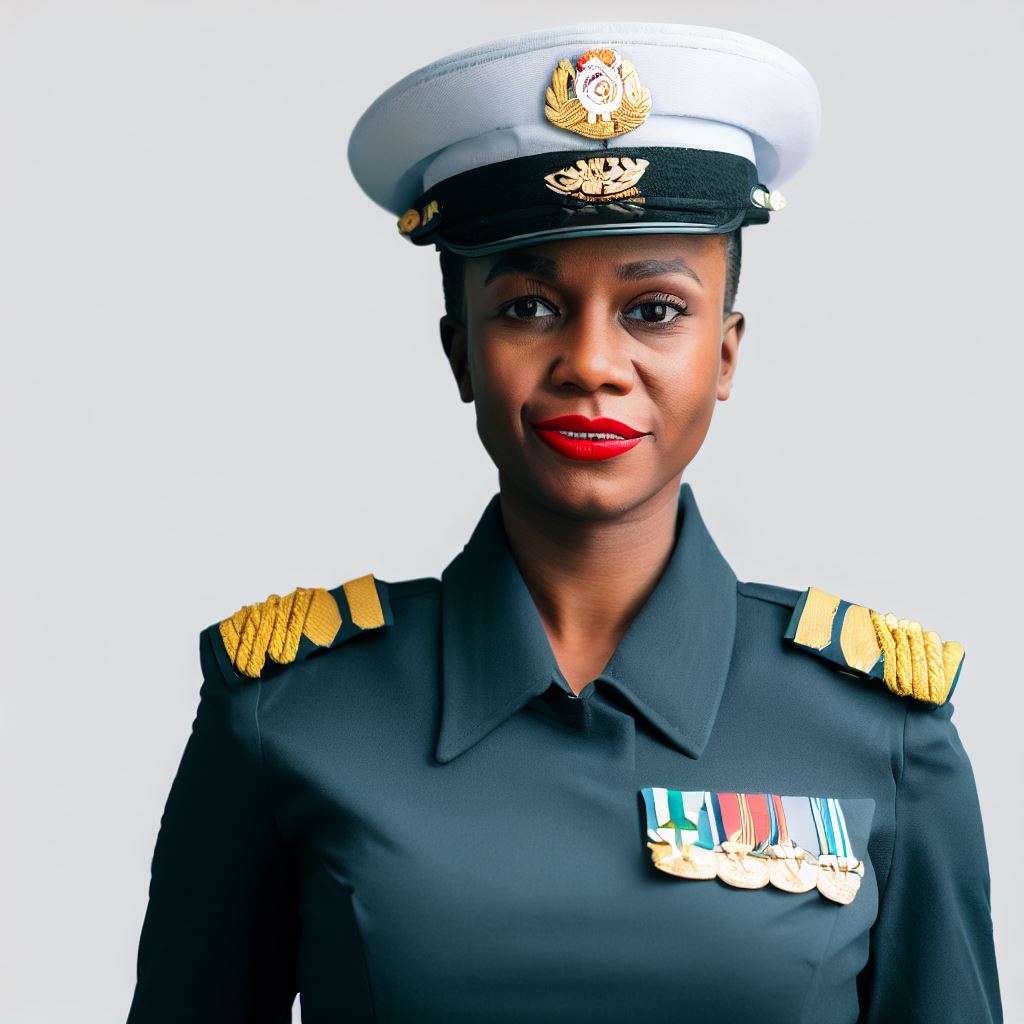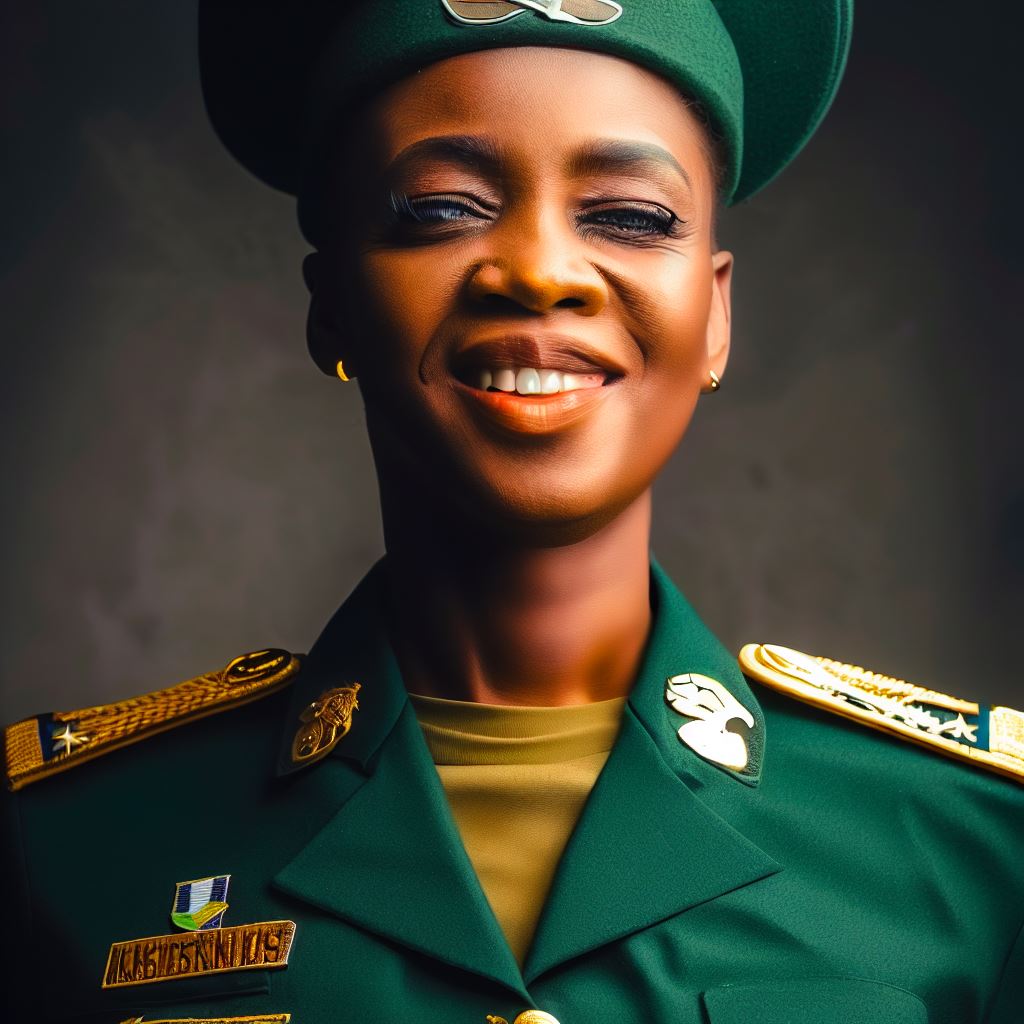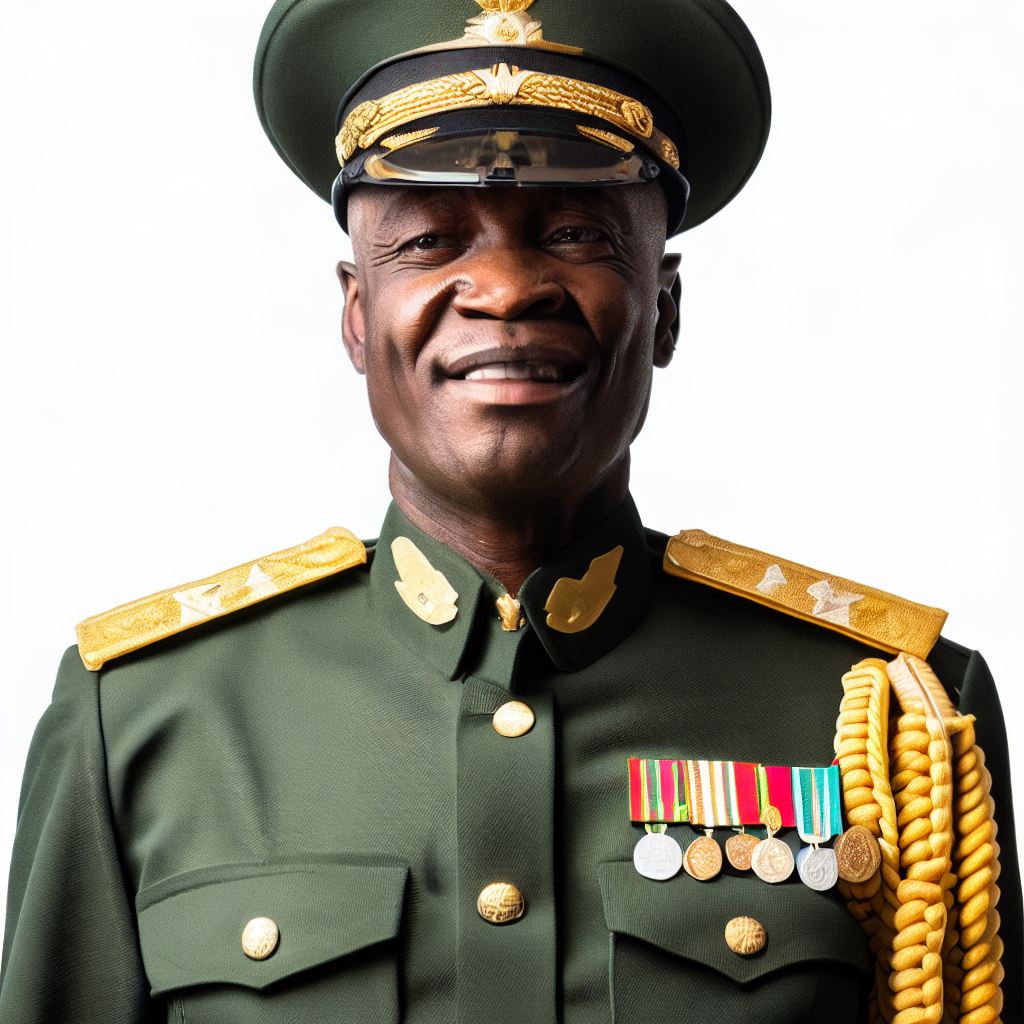Introduction
Let’s explore the Nigerian Naval Officers: Roles and Responsibilities
Nigerian Naval Officers play a crucial role in the defense and security of Nigeria’s territorial waters. Their responsibilities are of outmost importance.
They are highly trained professionals who are responsible for safeguarding the nation’s maritime interests, enforcing maritime laws, and ensuring the safety of maritime trade and transportation.
Their roles and responsibilities are of immense importance as they directly contribute to national security, economic progress, and safeguarding the sovereignty of Nigeria’s coastal areas.
Nigerian Naval Officers are tasked with various responsibilities, including surveillance and patrolling of Nigerian waters, intercepting illegal activities such as smuggling, piracy, and illegal fishing, and maintaining maritime order and security.
They also play a vital role in disaster response and search and rescue operations, assisting civil authorities in maritime accidents and emergencies, and providing humanitarian assistance to coastal communities affected by natural disasters.
Moreover, Nigerian Naval Officers collaborate with international partners to combat transnational crimes, such as drug trafficking, human trafficking, and illegal arms trade, which pose a threat to national security and stability.
In fact, Nigerian Naval Officers play a crucial role in ensuring the safety, security, and prosperity of Nigeria’s maritime domain.
Their dedication, professionalism, and expertise are pivotal in protecting national interests and upholding the rule of law at sea.
Background on the Nigerian Navy
History and establishment of the Nigerian Navy
- Nigerian Navy was established in 1956 as the Royal Nigerian Navy.
- It became the Nigerian Navy in 1963 after Nigeria became a republic.
- The main objective was to safeguard Nigeria’s maritime interests and enforce maritime laws.
- Nigeria acquired its first warship, NNS Nigeria, in 1964.
- Since then, the Nigerian Navy has undergone significant growth and development.
Size and structure of the Nigerian Navy
- The Nigerian Navy is one of Africa’s largest navies.
- It is composed of two main commands: the Western Naval Command and the Eastern Naval Command.
- The Nigerian Navy also has several bases and stations strategically located along the coast.
- The Navy has a fleet consisting of various types of vessels, including frigates, patrol boats, and submarines.
- The Nigerian Navy also operates helicopters and naval aircraft to support its operations.
- The Navy has a specialized unit called the Nigerian Navy Special Boat Service (SBS).
Importance of the Nigerian Navy for national security
- The Nigerian Navy plays a crucial role in protecting Nigeria’s maritime resources.
- It ensures the safety and security of Nigeria’s territorial waters and exclusive economic zone.
- The Navy conducts patrols to guard against illegal activities such as piracy, smuggling, and illegal fishing.
- It collaborates with international navies to combat transnational maritime crimes.
- The Nigerian Navy also participates in peacekeeping operations in the Gulf of Guinea region.
- Naval officers are responsible for maintaining a strong presence in critical maritime areas.
- They conduct regular surveillance and intelligence gathering to detect and deter potential threats.
- The Nigerian Navy contributes to the overall national defense and supports land and air forces.
- Naval officers undergo rigorous training to be prepared for various operational scenarios.
- They are responsible for the operation and maintenance of sophisticated naval equipment and systems.
- Naval officers also engage in humanitarian and disaster relief operations during emergencies.
In short, the Nigerian Navy has a rich history and has emerged as a vital force for national security. Its size, structure, and capabilities enable it to effectively protect Nigeria’s maritime interests.
The Navy’s importance cannot be overstated, as it plays a significant role in securing Nigeria’s waters and supporting international efforts to combat maritime crimes.
Naval officers shoulder great responsibilities and undergo extensive training to fulfill their duties. Their dedication and commitment ensure the safety and well-being of the nation’s maritime domain.
Read: The Ethics of Service: Nigerian Military Officers
Training and Qualifications for Nigerian Naval Officers
Overview of the training process
- The training process for Nigerian Naval Officers is rigorous and comprehensive.
- It is designed to prepare individuals for the challenges they will face in their roles.
- The training covers various aspects, including military tactics, navigation, and leadership skills.
Admission requirements and application process
- To be eligible for the training, candidates must meet specific admission requirements.
- These requirements include being a Nigerian citizen, having a minimum educational qualification, and passing a written examination.
- The application process involves filling out forms, submitting necessary documents, and undergoing a physical fitness assessment.
Duration and types of training programs
- The duration of training for Nigerian Naval Officers varies depending on the rank they are aspiring to.
- There are different training programs for different ranks, such as the Basic Training School, the Officer Cadet Training Scheme, and the Direct Short Service Commission Course.
- The training programs are meticulously structured to ensure the acquisition of necessary skills and knowledge.
The importance of physical fitness and mental capabilities
- Physical fitness is a crucial aspect of training for Nigerian Naval Officers.
- They undergo rigorous physical exercises and endurance challenges to ensure they are physically fit for their roles.
- Mental capabilities, including critical thinking and decision-making skills, are also emphasized during training.
- Naval officers need to be mentally sharp and capable of making quick and effective decisions in high-pressure situations.
In general, training and qualifications for Nigerian Naval Officers are of utmost importance. The training process is rigorous and comprehensive, covering various aspects essential for their roles.
Admission requirements and applications are carefully considered, and the duration and types of training programs vary depending on the rank.
Physical fitness and mental capabilities are emphasized to ensure officers are well-prepared for their responsibilities.
Read: Leadership Skills: Being an Officer in Nigeria’s Army
Roles and Responsibilities of Nigerian Naval Officers
Nigerian Naval Officers play a vital role in various aspects of national security. They are trained to perform a wide range of tasks related to naval warfare, security operations, peacekeeping, and administrative duties.
Naval warfare and security operations
In terms of naval warfare and security operations, Nigerian Naval Officers have an important responsibility to protect the country’s territorial waters.
This involves patrolling and ensuring the safety and sovereignty of Nigerian waters. They work to counteract piracy and other maritime crimes that pose a threat to the nation’s maritime domain.
Additionally, these officers engage in surveillance and intelligence gathering to secure the country’s maritime interests.
Peacekeeping and humanitarian missions
Another significant aspect of their role is peacekeeping and humanitarian missions.
Nigerian Naval Officers collaborate with international organizations and engage in joint efforts with other navies to maintain peace and stability.
They actively participate in peacekeeping missions in conflict zones, contributing to global peace efforts.
Furthermore, these officers provide assistance in disaster relief operations, including search and rescue missions, during natural disasters or humanitarian crises.
Administrative and managerial duties
In terms of administrative and managerial duties, Nigerian Naval Officers hold important responsibilities in personnel management and recruitment.
They are involved in the selection, training, and career development of naval personnel. Their expertise ensures the Navy has a capable and efficient workforce.
Additionally, these officers supervise naval bases and facilities, ensuring operational readiness and efficiency.
They play a vital role in the procurement and maintenance of naval assets, ensuring the Navy has the necessary equipment and resources to carry out its operations effectively.
The roles and responsibilities of Nigerian Naval Officers are diverse and demanding. They require dedication, professionalism, and a commitment to serving the nation.
These officers contribute to safeguarding the country’s territorial waters, maintaining peace and stability, and providing humanitarian assistance.
Their roles extend beyond traditional naval operations, encompassing administrative and managerial tasks vital for the overall functioning of the Nigerian Navy.
Read: Training at Nigeria Military Academies: A Guide

Career Opportunities and Advancement for Nigerian Naval Officers
Rank structure and career progression
Nigerian Naval Officers have the opportunity for career advancement through a well-defined rank structure.
The rank structure starts from Midshipman and progresses through various ranks such as Sub-Lieutenant, Lieutenant, and Commander.
Naval officers can aim for higher ranks like Captain, Commodore, Rear Admiral, Vice Admiral, and Admiral. Advancement is based on merit, performance, and completion of required courses and training programs.
Specialized career paths and opportunities for further training and education
Nigerian Naval Officers can choose specialized career paths in areas such as navigation, engineering, logistics, combat, and intelligence.
Specialized career paths provide officers with opportunities for further training and education in their respective fields.
Training programs are offered both locally and internationally to enhance skills and knowledge. Officers can pursue undergraduate and postgraduate degrees in relevant disciplines to complement their naval careers.
Benefits and incentives for naval officers
Nigerian Naval Officers enjoy a range of benefits and incentives that make their career attractive and rewarding.
Benefits include a competitive salary, allowances, and pension plans. Naval officers receive medical, housing, and transportation allowances to support their well-being.
Incentives such as paid vacation, healthcare coverage, and access to recreational facilities contribute to a good work-life balance.
Highlighting success stories to inspire potential applicants
Nigerian Naval Officers have achieved notable success in their careers, serving as role models for potential applicants.
Success stories can include officers who have risen to high ranks, received awards for bravery, or contributed significantly to national security.
Sharing these success stories can inspire individuals to consider a career in the Nigerian Navy and strive for excellence.
Highlighting success stories helps build confidence in the naval profession and attracts talented individuals to join and contribute to the nation’s defense.
In essence, Nigerian Naval Officers have numerous career opportunities and advancement prospects within the rank structure.
Specialized career paths and further training options allow officers to specialize in specific areas of interest. The benefits and incentives provided make the naval profession rewarding and attractive.
By highlighting success stories, potential applicants can be inspired to join the Nigerian Navy and contribute to its ongoing success.
Read: Women in Nigeria’s Military: Breaking Barriers
Challenges and Future Scope for Nigerian Naval Officers
Challenges Faced by Naval Officers in Fulfilling Their Roles
- Limited resources and inadequate funding affect the Nigerian Navy’s operational capabilities.
- Piracy and maritime criminality pose significant challenges to the security of Nigerian waters.
- Illegal oil bunkering and smuggling activities undermine the country’s economic growth.
- Navigating through complex geopolitical dynamics in the Gulf of Guinea presents strategic challenges.
- Ensuring effective coordination with other security agencies to combat maritime threats is a constant challenge.
- Safeguarding Nigeria’s maritime interests against foreign encroachment requires constant vigilance.
- The demanding nature of naval operations and long deployments lead to increased strain on officers and their families.
- Maintaining a high level of professionalism and discipline in the face of corruption and unethical practices is challenging.
- Providing adequate training and skill development opportunities to naval officers is crucial but often constrained by limited resources.
- Adapting to constantly changing maritime security dynamics and emerging threats demands continuous learning and readiness.
Advancements in Technology and Its Impact on Naval Operations
- The integration of advanced surveillance technologies enhances the Nigerian Navy’s situational awareness.
- Rapid advancements in communication systems facilitate seamless information sharing among naval officers.
- Developments in satellite technology and unmanned aerial vehicles improve the Navy’s surveillance capabilities.
- The use of sophisticated sonar systems and underwater drones enhances underwater domain awareness.
- Advancements in shipbuilding technologies lead to the construction of more capable and efficient naval vessels.
- Intelligence gathering systems and data analytics tools aid in detecting and countering maritime threats.
- Cybersecurity measures become essential to protect naval networks and critical infrastructure from cyber attacks.
- The integration of artificial intelligence and machine learning enables more effective decision-making in naval operations.
- Automation and robotics streamline routine tasks, allowing naval officers to focus on higher-level responsibilities.
- Emerging technologies like hypersonic missiles and directed energy weapons improve naval firepower and defense capabilities.
Future Prospects and Development Plans for the Nigerian Navy
- The Nigerian Navy aims to enhance its operational capacity through modernization and fleet expansion programs.
- Prioritizing international cooperation and collaborations to combat maritime threats in the Gulf of Guinea region.
- Investing in infrastructure development and upgrading naval bases to support extended operational reach.
- Improving human resource management practices and providing better welfare packages to retain skilled naval officers.
- Enhancing joint exercises and training programs with international partners to upgrade skills and knowledge.
- Incorporating green technologies and sustainable practices in naval operations for environmental conservation.
- Developing a robust indigenous defense industry to reduce dependence on foreign military equipment.
- Promoting gender equality and inclusivity by increasing the participation of women in the Nigerian Navy.
- Strengthening collaboration with maritime industry stakeholders to deter maritime criminal activities.
- Focusing on the capacity building of naval officers through continuous training and professional development.
In a nutshell, Nigerian naval officers face numerous challenges in fulfilling their roles, such as limited resources, piracy, and geopolitical dynamics.
However, advancements in technology positively impact naval operations through improved surveillance, communication, and firepower capabilities.
To overcome challenges and ensure future development, the Nigerian Navy focuses on various strategies, including modernization, international cooperation, and investment in infrastructure and human resources.
The future prospects of Nigerian naval officers involve the pursuit of sustainable practices, gender equality, and enhanced collaboration with maritime industry stakeholders.
With these efforts, the Nigerian Navy strives to safeguard the nation’s maritime interests and contribute to regional security.
Conclusion
To recap, Nigerian Naval Officers play crucial roles and carry out important responsibilities.
Their contributions to national security and maritime operations in Nigeria cannot be overstated.
I encourage support for the Nigerian Navy and exploration of career opportunities for interested individuals.




